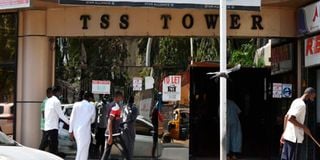SGR, Covid-19 leave landlords in Mombasa with empty buildings

TSS Tower at the heart of Mombasa and, below, Electricity House along Nkurumah Road with signs showing they have vacant space. Many commercial buildings in the coastal city have lost tenants due to the hard economic times.
Prime commercial buildings that were fetching high rent in Mombasa City centre have become empty as tenants vacate due to lack of business resulting from the Covid-19 pandemic and change of business model at the Port of Mombasa.
Famous buildings such as TSS, Mombasa Trading Centre, NSSF, Electricity House, Bima Towers, Posta, Canon Towers and Biashara, which were once fully occupied, are now half or quarter full.
Moving around the city, it is hard to pass by two buildings without seeing a sign calling for tenants, so much so that locals are now referring to the tourist town as the “To Let City”.
According to real estate players in the city, the pandemic has changed business models, with shipping and logistics firms that were the nerve centre of the city’s economic life shutting their physical offices and conducting their business online.
Mombasa thrived on port business, so the city suffered a major blow following the introduction of Standard Gauge Railway (SGR) freight trains and clearing of cargo at the Nairobi Inland Container Depot (ICD).
“Once cargo from the Mombasa port started being hauled directly to Nairobi ICD and the Naivasha dry port, most of the logistics companies that occupied much of the commercial spaces shifted operations, leaving us with no tenants,” said Tysons Limited property manager Alfred Wambua.
“Landlords have been forced to reduce the rent to sustain and accommodate the tenants whose income continued to dwindle by the day. Tenants have moved out, others relocated to more pocket-friendly buildings,” said Mr Wambua.
He added that the pandemic was like the last nail on the coffin that saw the businesses in the tourism hub collapse.
“We have tried to lower rent and give waivers to tenants but this too has not born much fruit. Mombasa lost it after the operationalisation of the SGR freight trains,” he said.
Mr Elius Maganga of Idime Property Management reiterated the fact that the shifting of businesses, especially the logistics companies, and Covid-19 have adversely affected the county’s economy.
He noted that downward rent adjustments by agents in the city ranged between 2 and 10 per cent, depending on the property and its location, but it was mostly in vain.
Solian Limited sales manager Brian Kosgei noted that the commercial space in Mombasa is undergoing dynamic changes. Because of the pandemic, most businesses are trying to lower their operating costs.
“Renting space has become unattractive. People are currently moving to shared workspaces. Some companies share the boardroom and reception, then they partition other spaces for the respective companies in order to share costs. It is becoming the norm. We have a few serviced apartments and people are renting them for weeks, or months,” Mr Kosgei explained.
He noted that most businesses, with the onset of the pandemic, had their staff work from home. Many, he said, moved online thus eliminating the need for office or commercial space.
“Working from home has revolutionised the work environment, it is limiting and reducing the space for clients… People tend to move where business is. And that is why there is a shift to Nairobi and Naivasha since the introduction of SGR’s cargo transport business,” he said.
“Even with the building where we are located, the tenancy has been at 30 per cent for the last four years. The facility was meant to be a high-end property, the place remains ‘empty’ despite it being at a strategic location, opposite Nyali Centre,” Mr Kosgei said.
Mr Kosgei added that Mombasa’s only hope lies in changes in policies to make the county attractive for commercial space once again.
Landlords called on the national government to market Mombasa destinations and promote domestic tourism to spur a revival of the city and therefore its businesses.
Mr Lovetone Mwongellah, a real estate consultant from Bamburi said some commercial buildings in Nyali are at 50 per cent occupancy unlike in Nairobi where spaces are hot cake.
“We are optimistic the road infrastructure currently ongoing within the county will help revive the economy of Mombasa, and different projects such as the Dongo Kundu Special Economic zone will revive the manufacturing industry,” said Mr Mwongellah.
Residential estates in areas such as Changamwe and Mikindani have not been spared the desertion, with landlords being forced to cut rents by almost half.
“For a three-bedroom house in Mikindani, we used to charge Sh25,000, but now we can rent even at Sh15,000. We have to do so instead of leaving the house unoccupied,” said John Karanja, a landlord in Mikindani.





